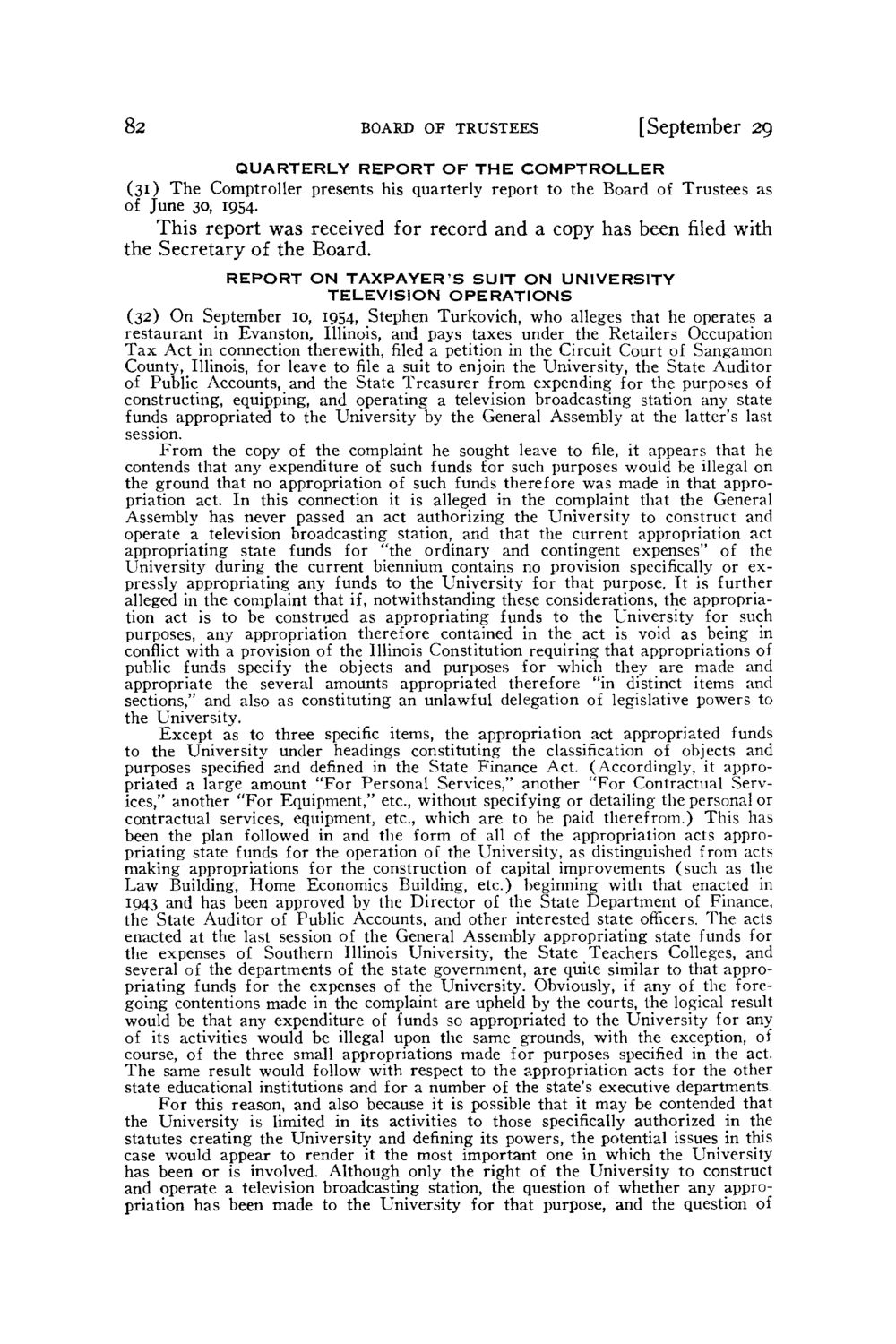| |
| |
Caption: Board of Trustees Minutes - 1956
This is a reduced-resolution page image for fast online browsing.

EXTRACTED TEXT FROM PAGE:
82 BOARD OF TRUSTEES [September 29 QUARTERLY REPORT OF THE COMPTROLLER (31) The Comptroller presents his quarterly report to the Board of Trustees as of June 30, 1954. This report was received for record and a copy has been filed with the Secretary of the Board. REPORT ON TAXPAYER'S SUIT ON UNIVERSITY TELEVISION OPERATIONS (32) On September 10, 1954, Stephen Turkovich, who alleges that he operates a restaurant in Evanston, Illinois, and pays taxes under the Retailers Occupation T a x Act in connection therewith, filed a petition in the Circuit Court of .Sangamon County, Illinois, for leave to file a suit to enjoin the University, the State Auditor of Public Accounts, and the State Treasurer from expending for the purposes of constructing, equipping, and operating a television broadcasting station any state funds appropriated to the University by the General Assembly at the lattcr's last session. From the copy of the complaint he sought leave to file, it appears that he contends that any expenditure of such funds for such purposes would be illegal on the ground that no appropriation of such funds therefore was made in that appropriation act. In this connection it is alleged in the complaint that the General Assembly has never passed an act authorizing the University to construct and operate a television broadcasting station, and that the current appropriation act appropriating state funds for "the ordinary and contingent expenses" of the University during the current biennium contains no provision specifically or expressly appropriating any funds to the University for that purpose. It is further alleged in the complaint that if, notwithstanding these considerations, the appropriation act is to be construed as appropriating funds to the University for such purposes, any appropriation therefore contained in the act is void as being in conflict with a provision of the Illinois Constitution requiring that appropriations of public funds specify the objects and purposes for which they are made and appropriate the several amounts appropriated therefore "in distinct items and sections," and also as constituting an unlawful delegation of legislative powers to the University. Except as to three specific items, the appropriation act appropriated funds to the University under headings constituting the classification of objects and purposes specified and defined in the State Finance Act. (Accordingly, it appropriated a large amount "For Personal Services," another "For Contractual Services," another "For Equipment," etc., without specifying or detailing the personal or contractual services, equipment, etc., which are to be paid therefrom.) This has been the plan followed in and the form of all of the appropriation acts appropriating state funds for the operation of the University, as distinguished from acts making appropriations for the construction of capital improvements (such as the Law Building, Home Economics Building, etc.) beginning with that enacted in 1943 and has been approved by the Director of the State Department of Finance, the State Auditor of Public Accounts, and other interested state officers. The acts enacted at the last session of the General Assembly appropriating state funds for the expenses of Southern Illinois University, the State Teachers Colleges, and several of the departments of the state government, are quite similar to that appropriating funds for the expenses of the University. Obviously, if any of the foregoing contentions made in the complaint are upheld by the courts, the logical result would be that any expenditure of funds so appropriated to the University for any of its activities would be illegal upon the same grounds, with the exception, of course, of the three small appropriations made for purposes specified in the act. The same result would follow with respect to the appropriation acts for the other state educational institutions and for a number of the state's executive departments. For this reason, and also because it is possible that it may be contended that the University is limited in its activities to those specifically authorized in the statutes creating the University and defining its powers, the potential issues in this case would appear to render it the most important one in which the University has been or is involved. Although only the right of the University to construct and operate a television broadcasting station, the question of whether any appropriation has been made to the University for that purpose, and the question of
| |